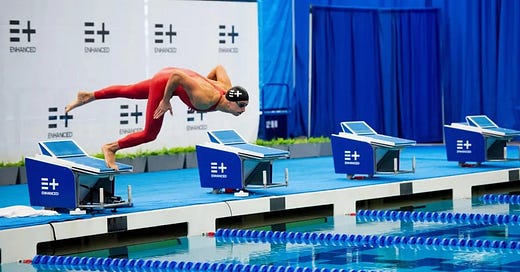Doping in plain sight: a great way to win? Or how to become a patsy for a medical grift?
'The Enhanced Games', funded by some of the world's richest venture capitalists, wants to help athletes break records via doping ... and cash-in on promoting drugs.
It was on Wednesday of last week that it was announced that Kristian Gkolomeev, a 31-year-old Bulgarian-born Greek swimmer, had broken the men’s 50m freestyle record, by clocking 20.89 seconds, or 0.02 seconds faster than the world record set in 2009 by Cesar Cielo of Brazil.
There were multiple twists in this tale, not least that this new “record”, which hasn’t been independently authenticated and won’t be accepted by swimming’s governing body, World Aquatics, actually happened on 25 February of this year, or three months ago, at the Greensboro Aquatic Center in North Carolina, USA.
Another significant twist is that Gkolomeev (below), who finished fifth in the men’s 50m freestyle final at Paris 2024 - his fourth Games swimming for Greece - swam his “record” after taking banned performance-enhancing drugs after committing to take part in the controversial Enhanced Games - an event where participants are mandated to use banned drugs to compete, supposedly in the name of scientific progress.
In February for his “record”, Gkolomeev was also wearing a polyurethane swimsuit, a costume banned from competition since 1 January 2010 by swimming’s world governing body for itself being performance-enhancing.
A third twist, which wasn’t so much surprising as a clunking PR move that sounded a figurative warning klaxon about the whole venture, was that the announcement of Gkolomeev’s “achievement” came on the same day that the Enhanced Games organisers held a launch in Las Vegas to say the inaugural Enhanced Games will take place in that city from 21 to 24 May next year.
Oh, and did I mention that you too can become “superhuman” via Enhanced Games assistance, for a pretty price? Which is really the point of this piece: pointing out that the promotion of drugs, and the sales of tailored programmes to help you take them, actually appears to be the point of the whole thing. We’ll return to that shortly.
If you think the video below is tasteless - it shows Gkolomeev’s February swim - and that it really shouldn’t be getting so much promotion, then know at least that the other side of this project (or grift depending on your viewpoint) is that everyone should be aware there are potentially hundreds of millions of dollars of profit in this, ahem, noble pursuit of human excellence.
The first iteration of the Enhanced Games event will include 50m and 100m freestyle and butterfly swimming events, 100m sprinting and 110m hurdle events on the track, plus two weightlifting events: the snatch, and clean & jerk. Prizes of up to $1m for world records will be available. Gkolomeev reportedly got that sum for his February feat.
Backers of the project - which has received widespread criticism, even derision, for multiple reasons ranging from safety issues to morality to taste - include a firm led US president Donald Trump’s son, Donald Jnr, and US venture capitalist and political activist Peter Thiel, who has an estimated fortune of $20.8BN, which places him just outside the world’s 100 richest individuals.
Enhanced Games officials say Gkolomeev’s fastest time was clocked using Olympic timing equipment overseen by seasoned officials but the stage management of the whole thing, and the timing of it being made public just as next year’s Vegas spectacle was revealed, raise other questions about the ultimate aim of the Enhanced Games.
"The Enhanced Games are not a sporting competition built on universal values like honesty, fairness and equity: they are a circus, built on shortcuts," said World Aquatics, which along with anti-doping agencies ranging from WADA to USADA to UKAD to the Chinese anti-doping agency, have condemned the venture.
"The enduring power of athletes to serve as role models for children and adults alike relies on their talent, hard work, respect and friendship. That's what we see in our champions and in our competitions, and that's what we'll continue to showcase."
Only four named athletes, all swimmers, including Gkolomeev, have so far publicly signed up for next year’s event, where organisers want at last 100 competitors across the sports.
The assumption is they will tempt more established Olympians to move into openly doping - and forsake their Olympic futures and perhaps reputations - for massive potential paydays.
Ukraine's Andrii Govorov, 33, Bulgaria’s Josif Miladinov, 21 and Australia’s James Magnussen, 34, are the only three apart from Gkolomeev to go public so far.
As The Guardian reported last week, potential participants “run the risk of their libido being “killed off” as well as a greater chance of heart attacks and psychiatric issues by taking performance enhanced drugs.”
Less widely reported is the Enhanced Games’ ratcheting up of a public offering of drug-fuelled “improvement” to members of the general public, at a price, which is what we will detail in the rest of this piece.





